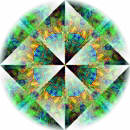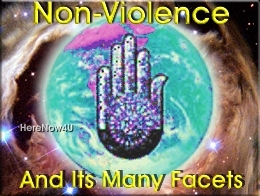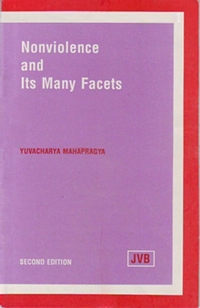
Some years ago we got an opportunity to hold a three week course in Preksha Meditation on the premises of the Rajasthan Police Academy. During that period we saw how the cadets were subjected to daily rigorous drills and training for hours together. The same is true of military cantonments. Concerted attempts are thus made to train people in the use of arms, to practice violence in order to counter violence. Armed forces in each country are taught how to use the latest and more and more destructive weaponry. Constant efforts are made to update weapon systems and to produce or acquire state of the art armament technology. Not only this, some states organize training even in terrorism. Untold energies are being thus poured to serve violence.

Is it not a paradox that we talk peace and non-violence and prepare for war and violence? This discrepancy between our professions and practice is as tragic as it is comic. In fact if it were not for widespread and persisting pain and unhappiness, people would perhaps not think of non-violence at all. Hiroshima and Nagasaki compelled them to think of the horrendous consequences of violence. The unprecedented destruction and human tragedy caused by the dropping of atom bombs unnerved even those who had faith in violence. Mythology and legend have spoken of things like deluge or doomsday or pralaya but here was its actual though partial enactment. So people started talking of world peace and disarmament. New movements were launched to achieve these laudable aims, yet simultaneously nations continued to manufacture even more infernal weapons and soon the dreaded prospect of space and star wars emerged on the horizon. We generally think that two contradictories cannot coexist. But here is a spectacle of nations making furious preparations for war and at the same time talking non-violence!

Under these circumstances people who have genuine faith in non-violence have to ask themselves whether they should continue merely to talk of and preach non-violence or they should take some serious steps in that direction. It is obvious that nothing much is being done in this respect. A multiplicity of platforms for preaching non-violence is also not going to achieve anything. We are reminded of a farmer who went to a monk and told sorrowfully how he had been digging a pit a day in his field for the past ten days without getting a drop of water. The monk replied that he would have got plenty of water only if he had concentrated on one pit and had deepened it enough instead of going on digging pit after pit. The lesson is obvious. Creating too many platforms or changing from one platform to another will be of no avail. What is needed is the strengthening and deepening of one's faith in non-violence. It must be understood that violence can solve no problem. Those who think it can and yet profess faith in non-violence are merely wearing a mask. Why do people not believe in the efficacy of non-violence? Why do they not have complete faith in its ultimate success? Why are there so few genuine believers in non-violence? Clearly the answer lies in there being no training in non-violence. Without adequate and proper mental training faith is not possible. We therefore need training, more so to counter violence which one learns and is exposed to since childhood.

How vitiated is the general atmosphere today? The general public has come to believe that unless it resorts to violence its voice will not be heard nor its protests heeded by the powers that be. On the other hand very often government finds it impossible to control mobs without the use of force. In either case violence is thought necessary to achieve the intended results. Besides, the general law and order situation in big cities has deteriorated to a point where people are left with no feeling of security whatsoever. Fear and insecurity breed greater violence. The only way to arrest this increasing trend of crime and violence is giving proper training in non-violence. Even if there is one duly trained non-violent person for every one hundred trained soldiers, a new miracle can be performed and a new order created.

Training is prerequisite for developing a non-violent personality. We have to recognize the fact that today negative ideas hold sway in life and positive ideas are at a discount. Violence, robbery, exploitation are all negative and the training being contemplated will therefore aim at replacing them by positive ideas. Let me here suggest just one method of doing it. Sit down adopting the posture of kayotsorg (total relaxation of the body) and practice making the mind free from all thoughts. It implies the absence of both memory and imagination, for both the past and the future are fetters of the mind. Attaining such a perfectly placid state of mind is an art that one learns through long and constant practice. It amounts to cleansing the mind. After remaining in the above state for five or ten minutes a conscious effort should be made to probe the mind with a view to finding out the negative Ideas harbored by it. This should go on for the same period, i.e. about five to ten minutes. Next give yourself the awareness of positive ideas by recalling and repeating them for the same length of time. In all it should take about forty minutes-forty minutes of training in non-violence. It will be the first lesson of developing a non-violent personality. Without some such training no amount of preaching or sermonizing will achieve the desired result. Any discussion on non-violence without an accompanying programme of training is meaningless.

The human personality has two faces -he outer and the inner. The former constitute physical looks, the latter quality or excellence. Only the other day I was reading an article that attracted me a great deal. It related to modern Japan's dominant position in the world of business and industry. Analysing the reasons the writer emphasized the Japanese insistence on quality. The Japanese of all ranks are undergoing training all the year round in the ways of ensuring the highest degree of quality control. No wonder Japanese goods command the highest respect even in the advanced western countries. The Japanese example can be applied to the field of human conduct. Have we even thought of quality control vis-a-vis non-violence? Being a monk I keep asking whether we have put our belief in non-violence to the toughest test. As fire purifies gold, experience of and experiments in non-violence refine its quality. Only by undergoing a thorough and rigorous training can one have firm faith in non-violence. Today more than ever before society needs to develop a non-violent personality of its members. Preksha Meditation provides an effective method for achieving the above end.

 Acharya Mahaprajna
Acharya Mahaprajna

